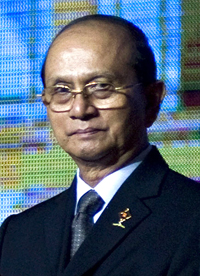By Associate Press Staff

President Thein Sein (Photo from Abhisit Vejjajiva/Flickr)
SITTWE, Myanmar (AP) — With fearful residents cowering indoors, security forces patrolling a tense town in western Myanmar collected bodies Monday from the debris of homes burned down over the weekend in some of the country’s deadliest sectarian bloodshed in years.
The violence, which has left at least seven people dead and hundreds of homes torched since Friday, poses one of the biggest tests yet for Myanmar’s new government, as it struggles to reform the nation after generations of military rule. The handling of the unrest will draw close scrutiny from Western powers, which have praised President Thein Sein’s administration in recent months and rewarded it by easing years of harsh economic sanctions.
Thein Sein declared a state of emergency in the region late Sunday and pleaded for an end to the “endless anarchic vengeance,” warning that if the situation is spun out of control, it could jeopardize the democratic reforms he has launched since taking office last year.
“We have not had any sleep for the last five days,” said Ma Ohn May, a 42-year-old textile shop owner in Sittwe, adding that residents were holed up and bracing for further ethnic clashes.
Violence between ethnic Rakhine Buddhists and members of a Muslim minority who call themselves Rohingyas erupted Friday in Rakhine state and spread Saturday to Sittwe. The area was mostly calm Monday.
The unrest — apparently triggered by the alleged rape and murder last month of a Buddhist girl by three Muslims and the June 3 lynching of 10 Muslims in retaliation — stems from long-standing tensions in the region.
The region’s Rohingya Muslims are seen by the government as illegal migrants from Bangladesh and are not officially recognized as one of the country’s national ethnic minorities. Although some are recent settlers, many have lived in Myanmar for centuries. The government position has rendered the Rohingyas effectively stateless, and rights groups say they have long suffered discrimination.
Although the basic problem is a local one, there is fear that the trouble could spread elsewhere because the split also runs along religious lines.
In Sittwe on Monday, shops, schools, and banks were closed, including the city’s main market. Some ethnic Rakhines wielding homemade swords could be seen guarding their homes or riding motorcycles.
Police in Sittwe retrieved four bodies, including one found in a river that was believed to be that of an ethnic Rakhine woman. The other three bodies were wrapped in blankets, but it was not clear who they were.
Police evacuated two Muslim families from the same area for their security because their Muslim homes were located among houses of ethnic Rakhines, who are predominantly Buddhist.
Ma Ohn May, the shop owner in Sittwe, said she and her colleagues had heard rumors that Muslims were approaching the coastal market by boat to launch an attack. She said her Buddhist cousin, living in the Muslim-dominated town of Maungdaw, had taken refuge in the local police headquarters.
“Her house has been damaged and she is living in fear,’’ Ma Ohn May said, adding that food and water were in short supply.
Thein Sein’s state of emergency was his first since becoming president. The measure allows the military to take over administrative functions for Rakhine State, a coastal region that borders Bangladesh.
In a nine-minute speech televised nationally Sunday night, Thein Sein said that the violence was fanned by dissatisfaction harbored by different religious and ethnic groups, hatred, and the desire for vengeance.
“If this endless anarchic vengeance and deadly acts continue, there is the danger of them spreading to other parts and being overwhelmed by subversive influences,” he said. “If that happens, it can severely affect peace and tranquility and our nascent democratic reforms and the development of the country.’’
In contrast to the previous military regime, Thein Sein’s government has been relatively open in releasing timely information about the recent trouble. Under the former ruling junta, such incidents usually went unreported or were referred to only in brief, cryptic fashion.
Thein Sein was elected with the backing of the military, but discarded many of its repressive policies to seek accommodation with the pro-democracy movement of Nobel Peace laureate Aung San Suu Kyi.
The accounts in state media blamed Friday’s rioting in Maungdaw and Buthidaung townships on 1,000 “terrorists,” but residents’ accounts made clear they were members of the local Muslim community.
The unrest seemed to be a reaction to the June 3 lynching of 10 Muslims by a crowd of 300 Buddhists. The lynch mob was apparently provoked by leaflets discussing the rape and murder last month of a Buddhist girl, allegedly by three Muslim men.
Army troops had been deployed Friday in Maungdaw and Buthidaung to help police keep order, and security officials were reported to have fired shots to quell the violence. Curfews were also imposed. (end)



